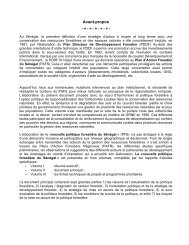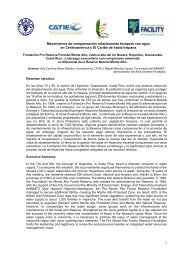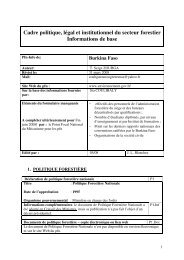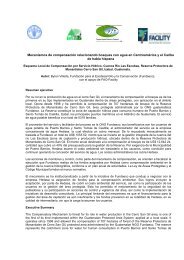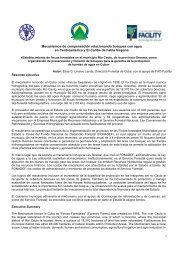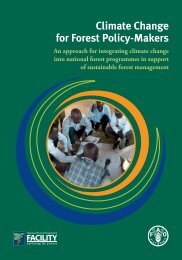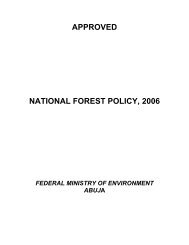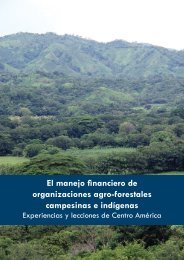2010 Progress Report â Draft - NFP Facility
2010 Progress Report â Draft - NFP Facility
2010 Progress Report â Draft - NFP Facility
You also want an ePaper? Increase the reach of your titles
YUMPU automatically turns print PDFs into web optimized ePapers that Google loves.
<strong>2010</strong> <strong>Progress</strong> <strong>Report</strong>The results of the workshops have been used in the second phase in which generic guidelines for theintegration of climate change considerations into national forest policies through national forestprogramme processes is being developed. An expert consultation was held in September <strong>2010</strong> at FAOHQ. National and international forest policy and climate change experts, including a participant fromeach of the four national stakeholder workshops commented the draft guidelines which will be finalisedand tested in 2011.Regular dissemination of publications on the <strong>Facility</strong> and the nfps was done to all partner countries for nationalworkshops and nfp focal points. The manual describing the nfp principles and the procedures of the <strong>Facility</strong> hasbeen translated into Spanish. A <strong>2010</strong> <strong>Facility</strong> desk calendar was printed and disseminated all over the world.Two new posters were published and disseminated.Enhancing Knowledge and CapacitiesThe “Nfp’s for All” modules on Conflict Management and Resolution and Stakeholders Participation Enhancementwere implemented intensively in <strong>2010</strong>. Details are given in the Country support section of this report.Support to National Financing Strategies and Mechanisms for sustainable use and conservation of forests wasprovided in Latin America and started in Africa. Details can be found in the Country Support of this report.The initiative on enhancing knowledge and capacities with ANAFE (ICRAF) on “Revitalising Forest Education inEastern African Countries”, started in 2009, was further developed as described in the Box below.Revitalizing Forest Education in East AfricaA widening gap between today’s role of trees and forests and what is being taught in forestryeducation has been noted. Therefore, it was felt that reforms are urgently needed in ForestryEducation to meet current and future needs because forestry curricula, pedagogy and learningresources remain largely traditional and grossly inadequate for addressing current challenges,especially meeting rural development needs, biodiversity, climate change, water, energy,wildlife & environmental conservation and sustenance of agricultural productivity. The links offorestry to livelihoods, business and development require a complete re-orientation, in tandemwith recent and future perspectives in integrated natural resources management.With the support of the <strong>Facility</strong>, a study was conducted in <strong>2010</strong> by ANAFE in four East Africancountries (Kenya, Uganda, Tanzania and Ethiopia). A Round Table of experts was held in DarEs Salaam in May <strong>2010</strong> to discuss the study findings and make suggestions for revitalizingforestry education in Africa. The study recommends developing new programmes, reviewingexisting ones and the delivery methods, enhancing the capacity of training institutions,improving the sharing of information and resources, increasing participation of stakeholders intraining activities, improving marketing of forestry and reviewing recruitment requirements toforestry training programmes, as some of the areas of major focus.Concerted efforts are needed particularly at global and regional levels to design, coordinateand link relevant institutions and stakeholders to help transform forestry education. Interinstitutionalcollaboration through the networking of institutions and other stakeholders willaugment efforts by individual countries or institutions. New resources are needed to financeimproved forestry education programmes.27



